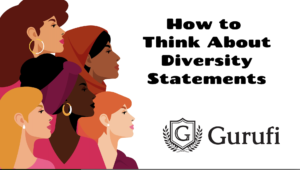
Five Tips for a Great Interview
As more schools have made interviews a core part of their admissions processes, it’s becoming even more important to make interview preparation a core part of your admissions process. At Gurufi, we have helped over 10,000 applicants earn admission into their dream schools, and many of these applicants are international students looking to learn in America. For these students, interviews can be especially daunting. Here, we’ll address common questions, talk about cultural nuances particular to America, and thoughts on how you can make a positive impression.
Understanding the Purpose of the Interview
School interviews serve several purposes. Understanding these can help you prepare more effectively:
1. **Assessing Fit:**
– The interview helps the admissions committee determine if you are a good fit for the program and if the program aligns with your academic and career goals. I sometimes tell clients that every admission to a competitive program / school is about two things: (1) are you generally prepared and qualified? And (2) Are you a good fit for this particular school / program? This is especially true of graduate and professional schools, most of which have particular areas of focus and unique cultures. As such, they use interviews to filter out people who, though smart and prepared, would not be ideal fits. Doing your research about what the school values can help you in this process.
2. **Evaluating Communication Skills:**
– Strong communication skills are essential for success in graduate school. The interview assesses your ability to articulate your thoughts clearly and confidently.
3. **Understanding Motivation:**
– The committee wants to understand your motivation for pursuing the program and how it fits into your long-term plans.
4. **Gauging Interpersonal Skills:**
– The interview provides insight into your interpersonal skills, such as your ability to interact with others, collaborate, and work effectively in a team.
Common Interview Questions
While each interview is unique, certain questions are commonly asked in graduate school interviews. Preparing answers to these can help you feel more confident:
1. **Tell Me About Yourself:**
– Provide a brief overview of your background, focusing on your academic and professional experiences, and how they relate to the program you are applying to. I do NOT recommend trying to memorize answers; you’ll come across as stiff and the pressure to “nail your lines” can make many people tongue-tied. The one exception that I’d make is to have a prepared 3-sentence response to this question. It’s often the first question asked, so knowing exactly what you’ll say can help to take the edge off.
2. **Why Do You Want to Attend This Program?:**
– Discuss your reasons for choosing this specific program, highlighting aspects such as faculty, research opportunities, and program strengths that align with your goals.
3. **What Are Your Research Interests?:**
– If you’re applying to a graduate school, this will certainly be brought up. Be prepared to discuss your research interests in detail, including any previous research experience, and how you plan to pursue these interests in the program.
4. **What Are Your Long-Term Career Goals?:**
– Share your long-term career aspirations and how the program will help you achieve them. Be specific about your goals and how they align with the program’s offerings.
5. **How Do You Handle Challenges or Conflicts?:**
– Provide examples of how you have dealt with challenges or conflicts in the past, emphasizing your problem-solving skills and resilience.
6. **What Are Your Strengths and Weaknesses?:**
– Be honest about your strengths and weaknesses. Focus on how your strengths will contribute to the program and what steps you are taking to address your weaknesses. Avoid the humble-brag “weakness” such as “sometimes I care too much” or “I work too hard.” Those are cringeworthy responses.
AND MOST IMPORTANTLY… at the end of the interview, you’ll often be asked, “do you have any question?” Your answer should never be “no.” Have several thoughtful questions prepared.
Cultural Nuances to Consider
Cultural differences can impact how interviews are conducted and perceived. Here are some cultural nuances to keep in mind:
1. **Formality and Titles:**
– In the U.S., interviews can be more informal than in other cultures. It is common to address professors by their first names, unless otherwise specified. I’ve found that a good strategy for ice-breaking is that, if you are referred to by your last name, politely suggest that they call you by your first name. For instance, “Please, my friends call me Brian.” In America, asking somebody to call you by your first name suggests familiarity and openness. By contrast, though, I would use your interviewer’s formal title (“Prof. Jones”) unless they refer to themselves otherwise or ask you to do so.
2. **Body Language:**
– Positive body language, such as maintaining eye contact, smiling, and offering a firm handshake, is important. It conveys confidence and engagement. I know that a lot of people believe in things like “mirroring” where you mimic the other person’s motions and body positions, but unless you’ve practiced it, I would avoid it because it can come across as creepy. Just keep it simple and remember the rules your mom taught you: sit up straight, smile, maintain eye contact, and offer a firm handshake.
3. **Punctuality:**
– Being on time for your interview is crucial. Arriving early shows respect for the interviewer’s time and demonstrates your commitment. If you show up to an office, be polite to the secretaries, staff, and other applicants! I can tell you that it can make a HUGE difference. Support staff are integral parts of offices and programs, and if they drop a negative comment about you because you were rude or condescending, that might be the end of your application.
4. **Direct Communication:**
– Americans value direct and concise communication. Be clear and to the point in your responses, avoiding overly elaborate explanations. For instance, if you’re asked a yes / no question that you feel needs a fuller explanation, begin with a simple yes or no, and then provide a fuller explanation. For instance, you might say, “Yes, but if I might add some context…”
5. **Expressing Enthusiasm:**
– Showing enthusiasm for the program and your field of study is important. Expressing genuine interest and passion can make a positive impression. Remember, people like positive, optimistic people. So keep this mindset.
Strategies to Make a Positive Impression
To make a lasting positive impression during your interview, consider the following strategies:
1. **Prepare Thoroughly:**
– Research the program, faculty, and current research projects. Being well-informed allows you to ask insightful questions and demonstrate your interest.
2. **Practice Your Responses:**
– Practice answering common interview questions with a friend or mentor. This helps you articulate your thoughts clearly and confidently. Again, as noted above, I would not try to MEMORIZE your answers. Instead, practice so that you feel comfortable with the basic beats of what you’ll say.
3. **Dress Appropriately:**
– Choose professional attire that is appropriate for the interview setting. Dressing well shows that you take the interview seriously.
4. **Be Yourself:**
– Authenticity is key. Be honest and genuine in your responses, and let your personality shine through.
5. **Follow Up:**
– Send a thank-you email after the interview, expressing your appreciation for the opportunity and reiterating your interest in the program. This can leave a positive final impression.
Zoom Interview Tips
As more interviews are conducted online, use these strategies to ensure that your virtual presentation is compelling.
- In addition to dressing appropriately, think about the space behind you and how you might curate it to reflect your interests. Nothing over the top. The background should first and foremost be clean, simple, and attractive. But, if you have an interest that you wouldn’t mind talking about, you can feature that. For instance, a framed jersey from a team you were on, a trophy, or some memento from a meaningful trip. I personally don’t love the virtual backgrounds. Obviously, make your own decisions about privacy, but if you can, use a more inviting natural background.
- I like to place Post-It notes on outside of the screen that offer words of encouragement (“just breathe and relax! You got this!”) or reminders (I often forget names, so I’ll write them down along with their titles). Having Post-Its of things that you want to remember to talk about is also useful.
- Do a test beforehand to ensure that what you think will be in the screen is what’s actually framed. I once did a Zoom call with a prospective student who was dressed in a suit… and basketball shorts. Not a problem except that he didn’t frame his shot properly, so we all actually saw his unusual outfit.
Preparing for a U.S. graduate program interview involves understanding the purpose of the interview, anticipating common questions, being mindful of cultural nuances, and employing strategies to make a positive impression. By thoroughly preparing and approaching the interview with confidence and authenticity, you can effectively showcase your qualifications and enthusiasm for the program. Remember, the interview is not only a chance for the admissions committee to evaluate you, but also an opportunity for you to learn more about the program and determine if it is the right fit for you.
For help with your personal statement, check us out at Gurufi.com. Our personal statement editors and consultants have decades of experience helping clients get into top Masters and Ph.D. programs in STEM, humanities, fine arts, and social sciences. Our specialty is helping you craft compelling personal statements that move the needle in your admissions process! For questions, shoot us an email at service@gurufi.com. Check us out on Facebook, Twitter, and LinkedIn.








